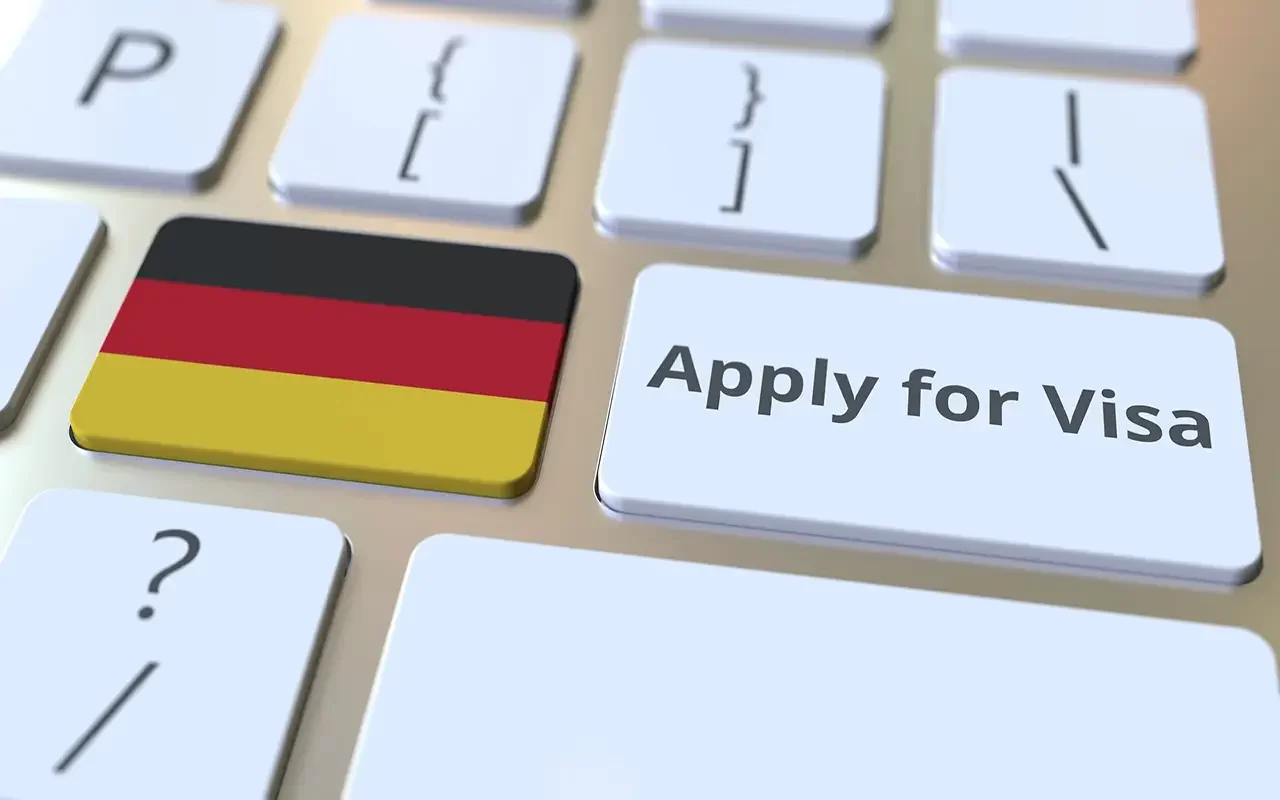
Table of Contents
Overview of German
Germany is a Western European country boarding France, Poland, the Czech Republic, Austria, Switzerland, Luxembourg, Belgium, the Netherlands, and Denmark. Its population of 83 million speaks German. One of the top 10 most visited countries in the world, Germany draws tens of millions of yearly visitors who come to experience its varied landscape, exceptional history, and iconic culture. The most populous Schengen country, Germany also has one the largest and strongest economies in Europe, where it is a pillar of the E.U. Divided into two states after the Second World War, East Germany and West Germany united into the Federal Republic of Germany in 1990. Today, the country comprises 16 semi-independent states, each with its own distinctive culture. Its capital, Berlin, is a diverse and international city increasingly influenced by a growing immigrant population. Berlin combines historic and modern architectural and cultural wonders, including the renovated Reichstag building, the seat of the German Parliament, and the iconic Brandenburg Gate, built in 1791. Travel to the top of the Berlin Television Tower, Europe’s tallest building, for 360° views of the city. Visit Museum Island, a UNESCO Heritage Site containing five of the city’s most significant museums, which collectively hold some of the world’s most significant collections of antiquities and 19th century paintings and sculptures. Berlin also includes a number of sobering yet essential museums and monuments dedicated to keeping alive the memory of the Holocaust and its Jewish victims. Sample its varied cuisine, influenced by decades of Turkish and (more recently arrived) Arab immigrants, and dominated by doner kebab and falafel. A world-wide center for techno and electronic music, Berlin is known for its intense clubbing scene. Outside the capital, Bavaria, Germany’s largest state and Catholic heartland, draws millions of visitors to its yearly Oktoberfest, a celebration of Bavarian culture grounded in beer drinking and the wearing of traditional dirndl costumes. Munich, Bavaria’s elegant capital and Germany’s third largest city, is a popular destination for business and tourism alike. The city hosts some of the largest companies in Europe, including Allianz and Siemens AG, as well as BMW. The neighboring BMW museum is a top draw, as is the Deutsches Museum, the world’s largest museum dedicated to technology and science. Sample traditional Bavarian cuisine, including pretzels, bratwurst, and Knödel (potatoes) at Munich’s elegant restaurants, and visit the massive 17th century Nymphenburg Palace. Outside Munich, the fairytale Neuschwanstein Castle (perhaps Germany’s most famous of its thousands of castles and palaces) draws over a million visitors a year. Further south, Germany’s alpine region offers hiking and skiing. One of the original signatories to the Schengen Agreement, in 1985, Germany became part of the official Schengen area in 1995.Germany Schengen Visa Eligibility
Schengen visa eligibility for Germany includes third country nationals from the following states, who are excluded from visa-free to Germany/the Schengen area, and are therefore eligible to apply for a Schengen visa to Germany:|
1. AFGHANISTAN |
53. LAOS |
|
2. ALGERIA |
54. LEBANON |
|
3. ANGOLA |
55. LESOTHO |
|
4. ARMENIA |
56. LIBERIA |
|
5. AZERBAIJAN |
57. LIBYA |
|
6. BAHRAIN |
58. MADAGASCAR |
|
7. BANGLADESH |
59. MALAWI |
|
8. BELARUS |
60. MALDIVES |
|
9. BELIZE |
61. MALI |
|
10. BENIN |
62. MAURITANIA |
|
11. BHUTAN |
63. MONGOLIA |
|
12. BOLIVIA |
64. MOROCCO |
|
13. BOTSWANA |
65. MOZAMBIQUE |
|
14. BURKINA FASO |
66. NAMIBIA |
|
15. BURMA/MYANMAR |
67. NAURU |
|
16. BURUNDI |
68. NEPAL |
|
17. CAMBODIA |
69. NIGER |
|
18. CAMEROON |
70. NIGERIA |
|
19. CAPE VERDE |
71. NORTH KOREA |
|
20. CENTRAL AFRICAN REPUBLIC |
72. OMAN |
|
21. CHAD |
73. PAKISTAN |
|
22. CHINA |
74. PAPUA NEW GUINEA |
|
23. COMOROS |
75. PHILIPPINES |
|
24. CONGO |
76. QATAR |
|
25. COTE D’IVOIRE |
77. RUSSIA |
|
26. CUBA |
78. RWANDA |
|
27. DEMOCRATIC REPUBLIC OF CONGO |
79. SAO TOME AND PRINCIPE |
|
28. DJIBOUTI |
80. SAUDI ARABIA |
|
29. DOMINICAN REPUBLIC |
81. SENEGAL |
|
30. ECUADOR |
82. SIERRA LEONE |
|
31. EGYPT |
83. SOMALIA |
|
32. EQUATORIAL GUINEA |
84. SOUTH AFRICA |
|
33. ERITREA |
85. SOUTH SUDAN |
|
34. ETHIOPIA |
86. SRI LANKA |
|
35. FIJI |
87. SUDAN |
|
36. GABON |
88. SURINAME |
|
37. GAMBIA |
89. SWAZILAND |
|
38. GHANA |
90. SYRIA |
|
39. GUINEA |
91. TAJIKISTAN |
|
40. GUINEA-BISSAU |
92. TANZANIA |
|
41. GUYANA |
93. THAILAND |
|
42. HAITI |
94. TOGO |
|
43. INDIA |
95. TUNISIA |
|
44. INDONESIA |
96. TURKEY |
|
45. IRAN |
97. TURKMENISTAN |
|
46. IRAQ |
98. UGANDA |
|
47. JAMAICA |
99. UZBEKISTAN |
|
48. JORDAN |
100.VIETNAM |
|
49. KAZAKHSTAN |
101.YEMEN |
|
50. KENYA |
102.ZAMBIA |
|
51. KUWAIT |
103.ZIMBABWE |
|
52. KYRGYZSTAN |
Required Documents for German Visa
All documents required for your German Schengen visa must be completed or translated into German or English, unless otherwise specified. Applications for German Schengen visa will contain the following Basic Required Documents:- Valid passport
- Passport sized photos
- Application form
- Fingerprints (biometric data)
- Travel medical insurance
- Visa Fee
- Materials related to your trip:
- Reason for visit
- Where you will stay (accommodation)
- How you will fund your trip (finances)
- Proof that you will leave Germany before your visa becomes invalid/expires. This is often in the form of a paid roundtrip plane ticket (proof of return).
Germany Schengen visa fees
The standard German Schengen visa fee for an adult is 80 Euros. Certain types of applicants (most students, children under 6) are exempt from all visa fees. To get a Schengen visa for Germany, you will likely have to submit a service payment with your visa application-this is a separate cost from the visa fee. Please note that these fees are non-refundable in the case of visa rejection.
How to Apply for a Germany visa: Steps
- Step 1: Determine your Purpose for travelling to Germany, which will determine the Type of visa you should apply for.
- Step 2: Determine how many Entries to Germany/the Schengen area you need.
- Step 3: Gather your Required Documents.
- Step 4: Schedule a Schengen Visa appointment (if applicable).
- Depending on the location of the consulate/visa center you are applying through, you may have to schedule an appointment in order to submit your application. Alternatively, you may be able to drop off your application without prior arrangement, so long as you do so during normal operating hours. Contact your consulate/visa center directly to find out if you need to schedule an appointment in order to submit your application.
- Step 5: Fill out your application.
- In almost all cases, applications for German Schengen visas can be found on the website of the specific consulate you are applying through, available for download in the abroad country’s local language, as well as English and German.
- You can also apply through Germany’s online visa navigator (this method has the advantage of being accessible in multiple languages other than German and English), through this link.
- Alternatively, you can download, complete, and print out the online form, available here. Submit this paper copy to whichever German Consulate/visa center you are applying through.
- Step 6: Pay the application fee.
- Step 7: Submit your German Schengen visa application (at least 15 days prior to travelling, not before 6 months).
- Different consulates/processing centers have different procedures for submitting applications. In most cases, applications must be submitted in person to the consulate/center you are applying through.
- When you submit your application, you will likely also be asked to submit biometric data (fingerprints). Children younger than 12 years are likely exempt from having their fingerprints collected. If you have previously submitted fingerprints (within the last 59 months), you likely will not need to resubmit them.
- Please note, after submitting your application you may be asked to return at a later date for a personal interview to provide further information/materials related to your trip.
When to Apply
Submit your application at least 15 days prior to the day you intend to travel, and no earlier than 6 months before you leave.
Where to Apply
Applications for Schengen visas to Germany should be submitted at either a German Consulate or a visa application center that has a relationship with Germany.
You should ideally lodge your application for a German Schengen visa in the country where you legally reside.
In countries where there is no German consular presence, applications may be lodged via the consulate of a Schengen state representing German consular interests.
Processing Time for Germany Schengen Visa
The German Schengen visa processing time is generally between 2-10 working days, although it can take longer in certain cases.
If your Germany visa was approved:
Collect your visa and make sure the information it contains is valid and complete.
If your Germany visa was denied:
If you receive a Schengen visa rejection for Germany you have the right to an appeal.
Begin this process by picking up your standard issued-visa refusal form, which describes why your request was denied, and explains the detailed steps of the appeal process.
Your appeal will likely have to be written in either German or English (or include a translation).
You will have to pay an appeal fee, which is likely non-refundable regardless of the outcome of the appeal (positive or negative).
Finally, once you obtain your Schengen Visa for Germany, please note the following:
Your visa may be revoked if you do not notify the consulate/visa application center of any changes to your trip itinerary that occur after you have submitted your application.
Being approved for a German visa does not guarantee you entry to either Germany or the general Schengen area-you can still be refused entry to both places upon arrival.
Alternatively, you may have to show additional documents regarding your finances or accommodation in order to enter Germany/the Schengen area.
Latest News and Articles
FAQ about Germany Schengen Visa
Who needs a Germany visa?
The Germany visa (also known as a German Schengen visa, or German visa) is essential for foreigners who are from countries outside the Schengen area, whose nationality makes them ineligible for visa-free access to the zone. Nationals of multiple countries, therefore, require Schengen visas to visit Germany and the rest of the Schengen area.
How long a Germany Schengen visa takes?
It takes anywhere from 15-60 days for a German Schengen visa to be processed by the requisite German consular authorities. Because of this, you should apply for your visa to Germany a minimum of two weeks before you need to be in the country.
Is Germany a Schengen country?
Germany is one of the founding Schengen countries (there are currently 27 states in the Schengen area).
Do I need Travel Medical Insurance for my Germany visa application?
If you are applying for a Germany Schengen Visa, Travel Medical Insurance is mandatory, you will have to submit proof of coverage with your application. This insurance is meant o provide you with coverage in the event that you experience medically related repatriation, medical care, and/or hospitalization or death while you are in the Schengen area on a Schengen visa. Therefore, if you experience a medical issue while you are abroad that requires you to go ot the hospital, your travel medical insurance will pay for the cost of your treatment, rather than your host country.
To simplify your application process, Insurte, partners with leading European Insurance Companies operating under EU regulations provide Compliant Schengen Visa insurances. If you wish o proceed: Buy my Travel Medical Insurance.


